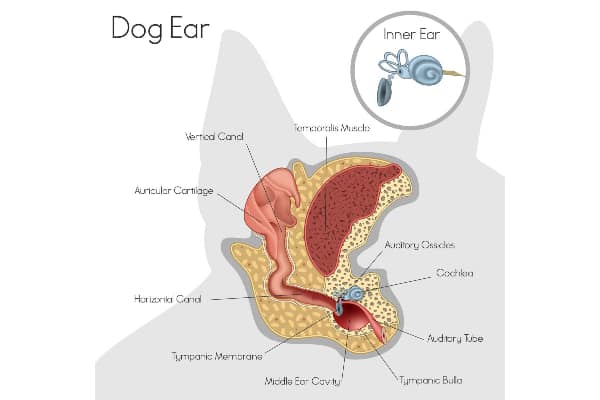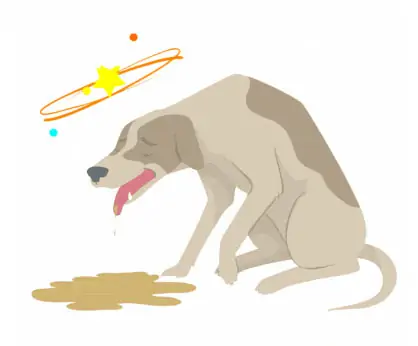If your dog is wobbly, off balance, and vomiting, it is important to seek immediate veterinary care. When our furry friends are not feeling well, it can be a cause of concern for us as pet owners.
If you’ve noticed that your dog is experiencing symptoms of wobbliness, imbalance, and vomiting, it is crucial to take action quickly and seek veterinary care. These symptoms can be indicative of various underlying issues, such as inner ear infections, intoxication, strokes, tumors, infectious or inflammatory diseases like meningitis, or idiopathic vestibular disease.
While some causes may be less likely, it is critical to have a professional evaluate your dog’s condition to determine the appropriate treatment and ensure their well-being. We will explore the potential causes and treatments for these symptoms to help you better understand your dog’s situation.

Credit: www.caninejournal.com
Causes Of Wobbliness, Off Balance, And Vomiting
When our furry friends experience wobbliness, off balance, and vomiting, it can be a cause for concern. Understanding the potential causes behind these symptoms is essential for identifying the right course of action and providing our beloved pets with the care they need. In this article, we will explore some of the common causes of wobbliness, off balance, and vomiting in dogs.
Inner/middle Ear Infections
Inner and middle ear infections can lead to wobbliness, off balance, and vomiting in dogs. These infections can disturb the delicate balance mechanisms in the ears, causing disorientation and a lack of coordination. If your dog’s symptoms are accompanied by ear inflammation or discharge, an inner/middle ear infection may be the culprit.
Intoxication
Intoxication from ingesting toxic substances such as medications, chemicals, or certain plants can result in wobbliness, off balance, and vomiting. Dogs can be curious creatures and may unknowingly consume harmful substances, leading to these symptoms. If you suspect your dog has ingested something toxic, it is crucial to seek veterinary assistance immediately.
Strokes
Strokes, although less common in dogs than in humans, can also cause wobbliness, off balance, and vomiting. A stroke occurs when the blood supply to the brain is compromised, leading to neurological impairments. If your dog experiences sudden and severe symptoms, such as a loss of coordination and vomiting, a stroke could be a potential cause.
Tumors
Tumors in the brain or the vestibular system can disrupt the normal functioning of these structures, resulting in wobbliness, off balance, and vomiting. These tumors can exert pressure on surrounding tissues and interfere with the proper transmission of signals. It’s essential to have your dog thoroughly examined by a veterinarian to determine the presence of any tumors.
Infectious Or Inflammatory Diseases
Infectious or inflammatory diseases, such as meningitis, can also lead to wobbliness, off balance, and vomiting in dogs. These conditions can affect the central nervous system, causing neurological symptoms and gastrointestinal disturbances. Prompt diagnosis and treatment are vital for managing these types of diseases.
Idiopathic Vestibular Disease
Idiopathic vestibular disease, often referred to as “old dog” vestibular syndrome, is a condition that affects the inner ear and vestibular system. The exact cause of this disease remains unknown, but it can cause wobbliness, off balance, and vomiting in dogs. Although it can be alarming to witness, most dogs recover from this condition with supportive care and time.
Remember, identifying the underlying cause of wobbliness, off balance, and vomiting in your dog requires professional veterinary assessment. If your dog exhibits these symptoms, it’s crucial to consult with your veterinarian for an accurate diagnosis and targeted treatment.

Credit: www.memphisveterinaryspecialists.com
Treatment For Wobbliness, Off Balance, And Vomiting
When your beloved dog is experiencing wobbliness, being off balance, and vomiting, it is important to seek proper treatment to ensure their well-being. Veterinary evaluation, medications, supportive care, and management of underlying conditions are key aspects of the treatment process.
Veterinary Evaluation
As soon as you notice your dog exhibiting these symptoms, it is crucial to consult with a veterinarian for a thorough evaluation. The veterinarian will conduct a comprehensive examination to determine the underlying cause of your dog’s wobbliness, off balance, and vomiting. This evaluation may include:
- Physical examination to assess your dog’s overall health
- Neurological assessment to check for any abnormalities
- Blood tests to evaluate organ function and rule out any potential systemic issues
- Imaging tests, such as X-rays or MRI, to identify any structural abnormalities or signs of inflammation
Medications
Based on the findings from the veterinary evaluation, your veterinarian may prescribe medications to address your dog’s symptoms and the underlying cause. Some commonly prescribed medications for wobbliness and vomiting in dogs include:
- Anti-vertigo medications to alleviate dizziness and improve balance
- Anti-nausea medications to reduce vomiting and relieve nausea
- Antibiotics or anti-inflammatory medications to treat infections or inflammation
- Pain medications to alleviate discomfort and support your dog’s recovery
Supportive Care
While undergoing treatment, your dog may require supportive care to help them feel more comfortable and promote healing. Supportive care measures may include:
- Providing a quiet and calm environment to reduce stress and support rest
- Offering easily digestible and bland food to prevent further gastrointestinal upset
- Administering fluids if your dog is dehydrated
- Assisting with mobility and preventing falls through the use of supportive devices or physical therapy
Management Of Underlying Conditions
In some cases, wobbliness, off balance, and vomiting may be symptoms of an underlying condition that requires long-term management. Your veterinarian will develop a treatment plan specific to your dog’s needs, which may involve:
- Continued medication to manage the underlying condition
- Dietary modifications to support your dog’s overall health
- Regular follow-up appointments to monitor your dog’s progress and adjust the treatment plan if needed
Remember that every dog is unique, and their treatment plan will be tailored to their specific needs. By seeking prompt veterinary care and following the prescribed treatment, you can help your dog recover and regain their balance and well-being.
When To Seek Veterinary Care
If your dog is experiencing wobbliness, loss of balance, and vomiting, it is important to seek veterinary care immediately. These symptoms could indicate various underlying issues such as inner ear infections, intoxication, strokes, tumors, or idiopathic vestibular disease. Your veterinarian can provide the necessary diagnosis and treatment for your dog’s condition.
Persistent Vomiting
If your dog is experiencing persistent vomiting, it is crucial to seek veterinary care immediately. While occasional vomiting can be relatively normal for dogs, persistent vomiting can be a sign of a more serious underlying issue. It could indicate gastrointestinal problems, such as gastritis or an obstruction, or it may be a symptom of a systemic condition. Rapid dehydration can also occur with frequent vomiting, which can be life-threatening for your furry friend.Blood In Vomit Or Diarrhea
The presence of blood in your dog’s vomit or diarrhea is a red flag that requires immediate veterinary attention. It could be a sign of gastrointestinal bleeding, which can have numerous causes, including ulcers, inflammatory bowel disease, or even ingestion of a foreign object. Blood in vomit or diarrhea should never be ignored, as it could indicate a potentially serious condition that needs prompt medical intervention.Other Serious Symptoms
While persistent vomiting and blood in vomit or diarrhea are primary reasons to seek veterinary care, it’s essential to pay attention to your dog’s overall behavior and other symptoms. Toxicity, for example, can cause a range of serious symptoms, including a wobbly gait, lethargy, drooling, or even collapse. If your dog is exhibiting any of these additional serious symptoms in conjunction with vomiting and imbalance, it is crucial to seek veterinary care as soon as possible. These symptoms could suggest a systemic illness or toxicity that requires immediate attention to ensure your dog’s well-being. Remember, your dog’s health is of utmost importance, and seeking veterinary care promptly can play a vital role in diagnosing and treating any underlying conditions causing the vomiting, imbalance, and other concerning symptoms.
Credit: toegrips.com
Frequently Asked Questions On My Dog Is Wobbly And Off Balance And Vomiting
Why Is My Dog Acting Drunk And Wobbly And Throwing Up?
If your dog is acting drunk, wobbly, and throwing up, it could be due to inner/middle ear infections, intoxication, strokes, tumors, infectious or inflammatory diseases (meningitis), idiopathic vestibular disease, or other less likely causes. Take your dog to the veterinarian for immediate attention if vomiting persists or blood is present.
Watch for other symptoms like lethargy, drooling, or collapse, as toxicity can cause serious complications.
Why Is My Dog Throwing Up And Now Wobbly?
If your dog is throwing up and now wobbly, it’s important to seek immediate veterinary attention. Potential causes include infections, intoxication, strokes, tumors, inflammatory diseases, or vestibular disease. Pay attention to other symptoms like lethargy, drooling, or collapse, as these can indicate toxicity.
A veterinarian will need to examine your dog and provide appropriate treatment.
Why Did My Dog Threw Up And Is Swaying?
If your dog is vomiting and swaying, it could be due to various reasons such as inner ear infections, intoxication, strokes, tumors, infectious or inflammatory diseases, idiopathic vestibular disease, or other less likely causes. It’s important to seek veterinary care if the vomiting persists or if there are additional symptoms like blood in the vomit, diarrhea, lethargy, drooling, or collapse.
What Causes Dizziness And Vomiting In Dogs?
Dizziness and vomiting in dogs can be caused by inner/middle ear infections, intoxication, strokes, tumors, infectious or inflammatory diseases, idiopathic vestibular disease, or other underlying health issues. It’s important to seek veterinary attention if your dog is experiencing these symptoms.
Conclusion
If your dog is experiencing wobbliness, loss of balance, and vomiting, it is crucial to seek veterinary attention immediately. These symptoms can be indicators of various underlying issues, such as infections, intoxication, strokes, tumors, or vestibular diseases. Pay attention to any other concerning behaviors your dog may be exhibiting, as it could be a sign of a more serious condition.
Remember, early diagnosis and treatment are key to ensuring your furry friend’s well-being. Trust your veterinarian to provide the necessary care and guidance for your dog’s recovery.



